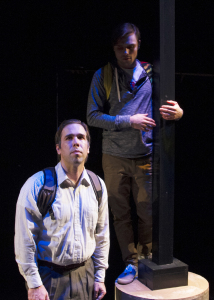‘A Bright New Boise’ sheds light on human frailties
by Eric Marchese

Idaho is built into Samuel D. Hunter’s playwriting DNA. The award-winning playwright is from Moscow, Idaho, and most of his major plays are set in his home state.
Something else bred into the marrow of Hunter’s plays is man’s relationship to God, and his involvement with various forms of organized religion, especially in a world driven by technology and profits.
“A Bright New Boise” exemplifies Hunter’s strengths as a playwright – a compassionate, Chekhovian observer of human frailty. You won’t find a better production of this 2011 Obie Award winner for playwriting than Chance Theater’s.
Director Trevor Biship deeply understands what motivates the five lost souls depicted in “Boise” and what frustrates them – and so does his perfectly chosen cast.
“Boise” follows Will Cronin (Casey Long), a deeply religious man who has moved to the state capital from rural northern Idaho.
At first Will seems only to want a part-time job at Hobby Lobby, a corporate-owned national chain of craft stores. We soon realize he’s running away from something while also seeking something else. He was connected to an evangelical church in his hometown recently rocked by controversy and scandal – a scandal into which he was intimately tied.
He has also tracked down his teen son Alex (Andrew Guerrero), who works at the Hobby Lobby. Alex has never known Will, who with Alex’s mom gave Alex up for adoption as an infant.
Turns out Alex doesn’t believe Will’s assertion of their biological connection – nor does he want to know Will. Not just the epitome of the sullen, hostile teen, Alex is intensely private and clearly too tightly wound, confessing right off the bat that he suffers panic attacks.
Hunter uses the interaction between these two characters to interweave a variety of his pet themes while offering three other personalities who shed light on the same themes, on Will and Alex’s relationship, and on human frailty in general.
Leroy (David Christian Vera) and Anna (Alex Bueno) are co-workers of Will and Alex. Leroy is Alex’s foster brother, fiercely protective of the young man his parents adopted. Anna is a well-meaning but rootless and aimless young woman whose mind and heart are buried in escapist fiction.
Supervisor to all four is Pauline (Karen Jean Olds), the craft store’s blunt, foul-mouthed manager. Bound by their connections within the company, the five form a clan so dysfunctional as to rival the most out-of-kilter of families.
A key line is Leroy crowding Will and boasting “I’m deliberately making you uncomfortable.” The phrase precisely describes what Hunter does comically with the play’s first few scenes, generating comedy through the discomfort of his characters – and within us as we watch.
The play’s comedy eventually evaporates, leaving the serious issues surrounding people who feel alienated from contemporary society and live on its fringe. It’s what Hunter does best, and it’s all powerfully driven home by Biship and his sterling cast.
Seemingly square and bland, a self-described “dork,” Will stops every so often in fervent attempts to summon The Rapture – an all-cleansing judgment of mortal man on earth during Christ’s second coming.
Quietly driven, Long’s Will is a soul in utter torment. Will is clearly haunted, deeply troubled and at a crossroads in his life, clinging desperately to his faith, and Long delivers a star turn that’s ultimately shattering.
Guerrero captures Alex’s initial contempt for Will and the belligerent, defensive posture he uses in vain attempts to control those around him. Obviously disturbed, Alex is socially and emotionally adrift, connecting with Will almost in spite of himself.
Bueno’s Anna is almost willfully oblivious to the world around her, preferring to be carried along by fate. The explosive Leroy and Pauline contrast with the more passive Will, Alex and Anna. Vera essays Leroy’s hostile artistic temperament and intimidating manner. Olds’ hilariously profane Pauline curses a blue streak in an upper Midwest dialect, insisting on imposing order upon chaos wherever she finds it.
Bruce Goodrich’s Hobby Lobby break room set is, aptly, suffocatingly cold and sterile, ideal as a crucible for Hunter’s characters. Jeff Polunas’ videos (of, among other things, bizarre medical surgeries) likewise set up the play’s off-center tone.
“A Bright New Boise” matches up with Chance Theater’s history of significant major productions – a list that includes “Porcelain,” “One Flea Spare,” “Rabbit Hole,” “Coyote on a Fence,” “Frozen,” “Jesus Hates Me,” “The Goat, or Who is Sylvia?,” “Jerry Springer, the Opera,” “Overlooked,” and Chance’s two-part “Laramie Project” epic.
Leave a Reply

